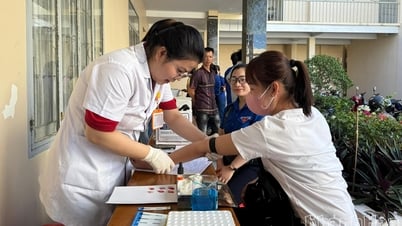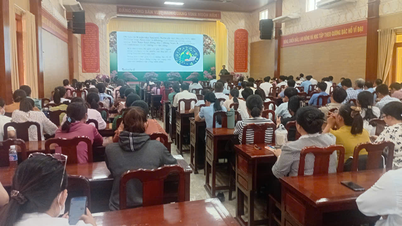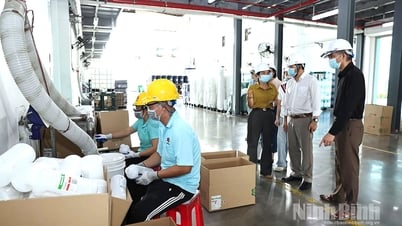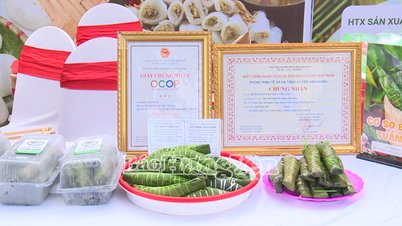Previously, all food production and processing establishments in the agricultural, forestry and fishery sector had to be assessed and certified by the Khanh Hoa Department of Agricultural, Forestry and Fishery Product Quality Management and granted a certificate of eligibility for food safety (FSM). However, according to current regulations, small-scale establishments in this sector are self-committed to producing and trading safe agricultural, forestry and fishery products. Discussing further about this regulation, Mr. Chu Duc Hung - Deputy Head of the Department of Agricultural, Forestry and Fishery Product Quality Management of the province said:
 |
| Mr. Chu Duc Hung - Deputy Head of the Department of Agricultural, Forestry and Fishery Product Quality Management of the province |
In recent years, based on the assigned functions and tasks, the Department has presided over and coordinated with relevant agencies and units to synchronously and extensively deploy many measures to strengthen state management of food safety and hygiene for agricultural, forestry and fishery products. Currently, there are 1,242 establishments granted certificates of eligibility for food safety, including 646 fishing vessels with a length of 15m or more and 596 establishments producing and trading agricultural, forestry and fishery products.
To strengthen the quality supervision and food safety of agriculture, forestry and fishery products, the Department regularly organizes quality supervision and food safety activities in combination with periodic inspections and monitoring assessments according to regulations. Facilities with sample results that do not meet food safety requirements will be handled and strictly prohibited from releasing products to the market without additional analysis results that meet the requirements. The results of inspections and assessments of food safety conditions of facilities are all made public on the website of the Department of Agriculture and Rural Development (DARD) so that consumers can know and choose safe products. Thanks to that, awareness of compliance with legal regulations in production and business has been significantly improved, the number of facilities inspected and certified to meet food safety conditions has continuously increased, and the number of facilities that do not meet food safety conditions has decreased.
- It is known that the regulations on subjects granted food safety certificates in the fields of agriculture, forestry and fishery have changed. Can you tell us more about this regulation?
- Previously, all production and business establishments in the fields of agriculture, forestry, fishery and fishing vessels were required to have a certificate of eligibility for food safety. This certificate was issued by the department after the assessment met the requirements. However, according to current regulations, small-scale establishments only need to commit to ensuring food safety with the local authorities and comply with the commitment, without having to carry out the procedure for granting a certificate of eligibility for food safety as before.
 |
| Officers of the department appraise and evaluate food safety conditions at a fish sauce production facility in Nha Trang. |
- So which facilities are not eligible for a certificate of food safety eligibility, sir?
- According to regulations, establishments that are not eligible for a certificate of food safety eligibility in the field of agriculture and rural development are: small-scale primary production; food production and trading without a fixed location; small-scale preliminary processing; small-scale food trading; pre-packaged food trading; establishments that have been granted one of the following certificates: Good Manufacturing Practice (GMP), Hazard Analysis and Critical Control Points (HACCP), ISO 22000 Food Safety Management System, International Food Standards (IFS), Global Food Safety Standards (BRC), Food Safety System Certification (FSSC 22000) or equivalent that is still valid.
In which, small-scale primary production establishments are establishments that grow, raise, harvest, catch, and exploit food ingredients on a household or individual scale or without a business registration certificate. Small-scale primary processing establishments are establishments that process food on a household or individual scale with or without a business registration certificate. Small-scale food business establishments are establishments registered by individuals, groups of individuals, or households as household businesses and establishments that are not granted a business registration certificate or an enterprise registration certificate or an investment certificate according to regulations.
- So according to current regulations, who will manage these facilities, sir?
- Currently, according to Decision No. 08 dated March 27, 2020 of the Provincial People's Committee promulgating regulations on assignment and decentralization of responsibility for managing food safety conditions for agricultural, forestry and fishery production and trading establishments that are not subject to the issuance of Certificates of eligibility for food safety under the management of the Ministry of Agriculture and Rural Development in the province, for agricultural, forestry and fishery food production and trading establishments that are not subject to the issuance of Certificates of eligibility for food safety under the Ministry of Agriculture and Rural Development, the responsibility for food safety management is assigned to the People's Committees of communes, wards and towns in the province. Accordingly, the People's Committees at the commune level are responsible for reviewing and making statistics of establishments under their management; disseminating and providing guidance on safe food production and trading and organizing establishments to sign commitments to produce and trade safe food according to the provisions of Circular No. 17/2018 of the Ministry of Agriculture and Rural Development. These establishments sign a commitment to produce and trade safe food with the People's Committees of communes, wards and towns. In particular, the establishments commit to fully comply with food safety requirements according to current laws, and if there are any violations, they must take full responsibility before the law. At the same time, the People's Committees of communes are responsible for inspecting the implementation of the committed contents of the production and trading establishments. Depending on the level of violation, the establishments may be reminded, publicly disclose their failure to properly implement the commitment to produce and trade safe food or recommend competent authorities to handle violations according to current laws.
Thank you!
HONG DANG (Implementation)
Source











































































































Comment (0)